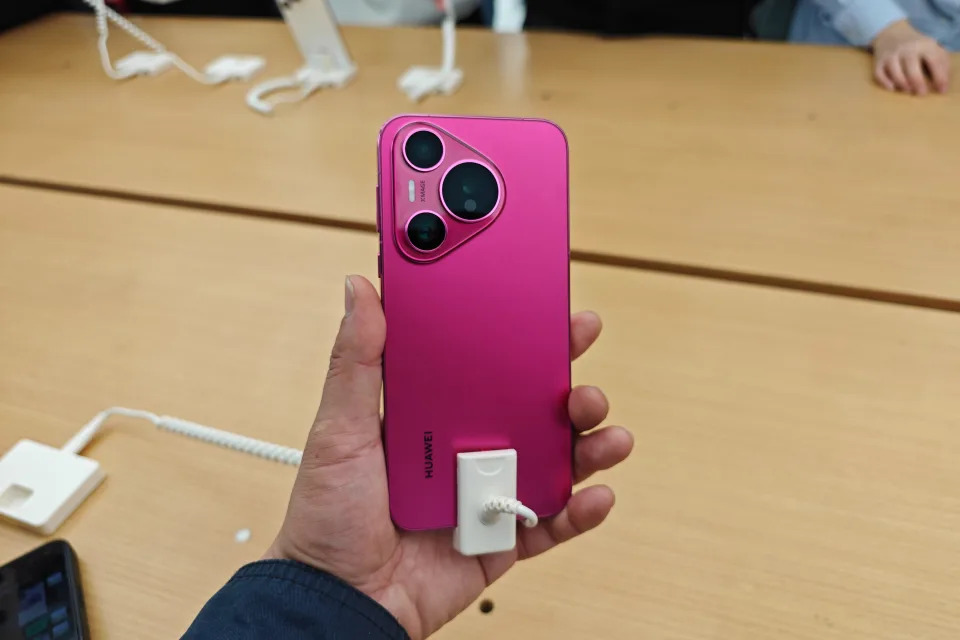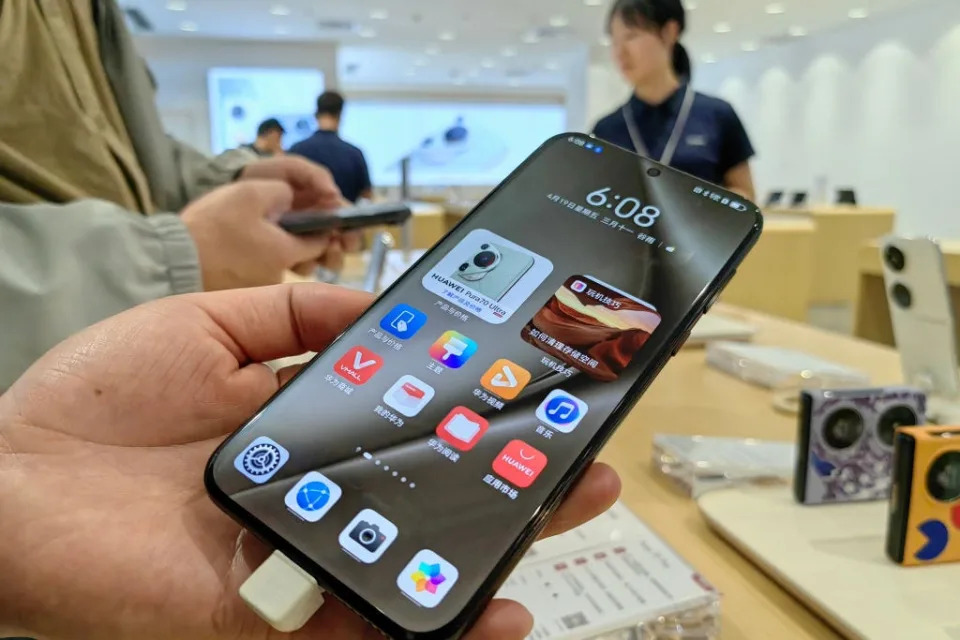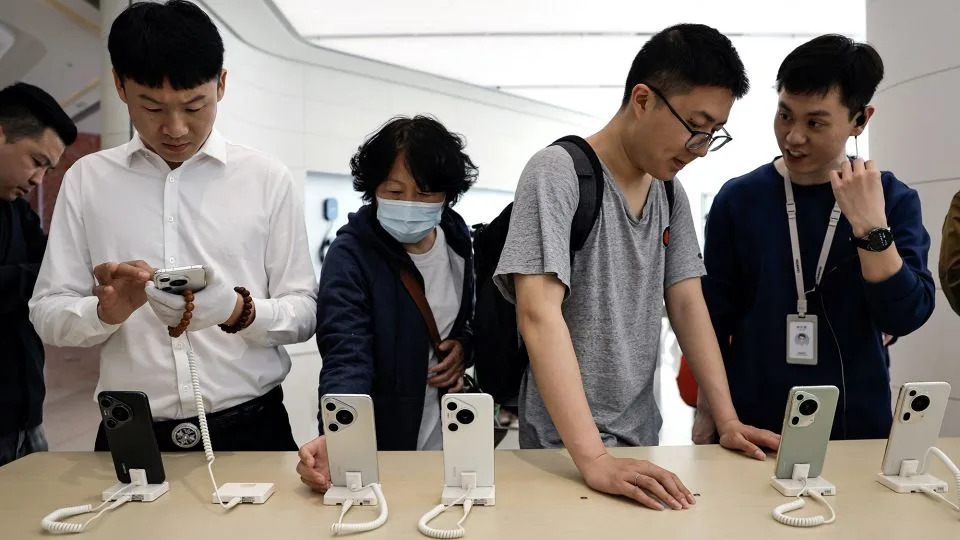Huawei is not only making a roaring comeback in China, it is also on the verge of overtaking Apple in the world’s largest smartphone market.
The Shenzhen-based conglomerate, which has been a flashpoint in the escalating rivalry between Washington and Beijing, saw 70% year-on-year growth in its smartphone sales in China in the first quarter, while Apple’s sales declined by more than 19%, according to Counterpoint Research.
“Apple’s sales were subdued during the quarter as Huawei’s comeback has directly impacted Apple in the premium segment,” said Ivan Lam, senior research analyst at Counterpoint.
The iPhone maker, which led China’s smartphone market with a share of nearly 20% in the first quarter of 2023, has fallen to the third spot in the first three months of this year, according to Counterpoint. Its market share now stands at 15.7%, while Huawei’s has jumped to 15.5%, from 9.3% last year.
Huawei’s popular Mate 60 Pro smartphone made headlines last year when the US government sought more information about the model, which included a sophisticated processor. Its debut shocked industry experts who questioned how the company could acquire such a chip following sweeping efforts by the United States to restrict China’s access to foreign chip technology because of national security concerns.
Counterpoint’s data comes just days after another market research firm IDC said Apple’s global smartphone sales had tumbled 10% in the first quarter, mainly because of loss of momentum in China.
China is the largest market behind the United States for Apple, but the company is facing a challenging time in the world’s second-largest economy. Chinese consumers, who once would have considered Apple, are now turning to Chinese brands.
Overall smartphone sales in China grew 1.5% in the first quarter, according to Counterpoint. Local smartphone makers Vivo and Honor were the top two brands by market share.
Apple's Q1 smartphone shipments in China tumble 19%, data shows
Apple's smartphone shipments in China tumbled 19% in the first quarter of the year, the worst performance since 2020, as the iPhone maker took a hit from Huawei's new product launches in the premium segment, market data showed.
Apple's share in the world's biggest smartphone market fell to 15.7% in the first quarter from 19.7% a year earlier. That put it almost level with Huawei, which saw sales jump 70%, according to research firm Counterpoint.
Apple lost its crown as the biggest smartphone seller in China to rival Vivo, sliding to third place in the quarter, followed by Huawei whose market share jumped to 15.5% from 9.3% a year earlier. Honor, a mass market brand spun out of Huawei, was in second place.
"Huawei’s comeback has directly impacted Apple in the premium segment. Besides, the replacement demand for Apple has been slightly subdued compared to previous years," said Counterpoint analyst Ivan Lam in a press release.
"For the second quarter, the possibility of new color options combined with aggressive sales initiatives could bring the brand back into positive territory," Lam said, adding it is seeing slow but steady improvement in weekly iPhone sales.
China is Apple's third-biggest market and generated around 17% of its total revenue in the October-December quarter.
Its market share loss in China comes after separate data showed earlier this month that the U.S. firm suffered nearly a 10% drop in global smartphone shipments in the first quarter of 2024, hurt by intensifying competition by Android smartphone makers led by Samsung Electronics.
Samsung clinched the top phonemaker spot from Apple in the first quarter.
Shares of Apple slipped 0.4% in premarket trade on Tuesday. The stock has fallen about 14% so far this year and posted its worst weekly performance in over eight months on Friday.
Throughout the first quarter, Apple launched campaigns in China to entice consumers with discounts, including subsidizing certain iPhone models by as much as 1,300 yuan ($180).
Huawei last week released its Pura 70 series of high-end phones after launching the Mate 60 series in August. The Mate 60 was seen as a comeback for the Chinese firm in the high-end market and described as a triumph over U.S. sanctions on the company, as the handsets contain an advanced China-made chip.
U.S. Commerce Secretary Gina Raimondo said on Sunday that the chip powering Huawei's flagship phone is not as advanced as American chips, arguing it showed U.S. curbs on shipments to the telecoms equipment giant are working.
Canadian research firm TechInsights expects overall shipments in China this year to top 50 million units, including 10 million for the Pura 70 series. That would make Huawei the No. 1 seller with a 19% market share, up from 12% in 2023.
In the first quarter, China's smartphone market grew 1.5%, marking the second consecutive quarter of positive growth, according to Counterpoint.
Apple has its worst China quarter since 2020 as Huawei’s resurgence eats into its market share, says new research
U.S. Secretary of Commerce Gina Raimondo dismissed Huawei's new 5G smartphone over the weekend as having "not nearly as good" a processor as what's available in the U.S. But there's one thing the U.S-blacklisted company's new phone may be really good at: taking sales from Apple.
The quiet launch of Huawei's Mate 60 Pro is transforming China's phone market as consumers shift to local brands. Apple's shipments tumbled 19% year-on-year in the first quarter of the year, the company's worst performance since 2020, according to data from Counterpoint Research.
The U.S. company now has market share of around 15.7%, down from 19.7% a year ago. The drop puts Apple in third place in China's smartphone market, behind Vivo and HONOR.
Apple's decline contrasts with Huawei's rise. The Chinese smartphone maker's sales in the first quarter of 2024 jumped by almost 70%. It now has 15.5% of China's phone market, putting it just behind Apple. Counterpoint partly attributed Huawei's growth to the company's 5G smartphone, giving the tech giant "a massive share in the $600+ premium segment."
HONOR, a former Huawei subsidiary spun off in 2020, is in second place after its sales grew 11.5% year-on-year.
Apple led the Chinese smartphone market for 2023 as a whole, ahead of Vivo, Oppo and Xiaomi, according to Counterpoint data,
Fierce competition in China helped to knock Apple from its perch as the top global seller of smartphones last quarter, according to an IDC report released last week. South Korea's Samsung is now in first place.
Huawei's rise
Chinese consumers could be attracted by the price of Huawei's 5G phone, which is cheaper than Apple's iPhone. But Chinese media also promoted the Mate 60 Pro, which features a domestically-produced advanced chip, as a source of national pride upon its launch last year.
Huawei sold 1.6 million Mate 60 Pro handsets in the six weeks following its launch, and sales have remained strong since.
A resurgent Huawei is just one of the challenges to Apple's business in China. The iPhone maker is dealing with greater regulatory scrutiny: Beijing reportedly told government officials and employees at state-owned enterprises to stop using iPhones, and regulators ordered Apple to remove several foreign programs, like WhatsApp, Threads and Signal, from its China app store last week on "national security concerns."
Apple is also trying to diversify its supply chain to rely less on Chinese suppliers. CEO Tim Cook made a whirlwind visit to Southeast Asia last week which may have been an effort to "hedge [Apple's] supply chain bets," analysts previously told Fortune.
Apple sinks to 3rd place in China as iPhone sales slide
-
Apple's China headache is getting worse.
-
A slide in iPhone sales has left Apple in third place in China, per Counterpoint Research estimates.
-
It's the iPhone's worst performance in China since 2020 amid rising competition from local rivals.
Apple's struggles in China just keep getting worse.
It's sunk from first to third place in the Chinese smartphone market after iPhone sales tumbled 19% in the first three months of the year, according to estimates from Counterpoint Research.
The sales slump marks the iPhone's worst performance in China since 2020 and underlines increasingly tough competition from local rivals.
Chinese-based rivals Vivo and Honor outpaced Apple's sales in the first quarter of the year, per Counterpoint data. Apple finished the quarter with a 15.7% share of the market, down from 19.7% in the same period last year and barely ahead of Huawei's 15.5%, per the research outfit.
In stark contrast with Apple's slide, Huawei sales soared by almost 70% compared with the first three months of 2023.
Counterpoint research analyst Ivan Lam said in a note that Huawei's surge had directly affected iPhone sales in China. Apple had also been hit by fewer consumers replacing their smartphones, he added.
Huawei's rise has given Apple CEO Tim Cook a new headache, given he's already dealing with disappointing iPhone 15 sales and government bans in China. Cook went to China in March to visit Apple's newest store in Shanghai and attend the high-profile China Development Forum in Beijing.

Huawei recently released a new series of smartphones called the Pura 70 that has an advanced camera system similar to the trio of lenses on the iPhone Pro range.
The new phones, which start at $760, provide Huawei with a new opportunity to win over Chinese customers from Apple. Last year the company launched the Mate 60 Pro series that was aimed at iPhone 15 buyers.

Despite the stiff competition, Lam said iPhone sales could still reverse their downward slide.
"We are seeing slow but steady improvement from week to week, so momentum could be shifting," he said. "For the second quarter, the possibility of new color options combined with aggressive sales initiatives could bring the brand back into positive territory."
The 19% decline is slightly better than the 24% slide that Counterpoint had estimated for the first six weeks of the year.
The Chinese smartphone market is crucial for Apple as it's second only to the US, and is ahead of Europe.
Apple has been fighting on multiple fronts this year. In March, the European Commission fined the company about 1.8 billion euros ($1.95 billion). In the US, Apple is battling an antitrust lawsuit from the Department of Justice.
Apple did not immediately respond to a request for comment from Business Insider, made outside normal working hours.




